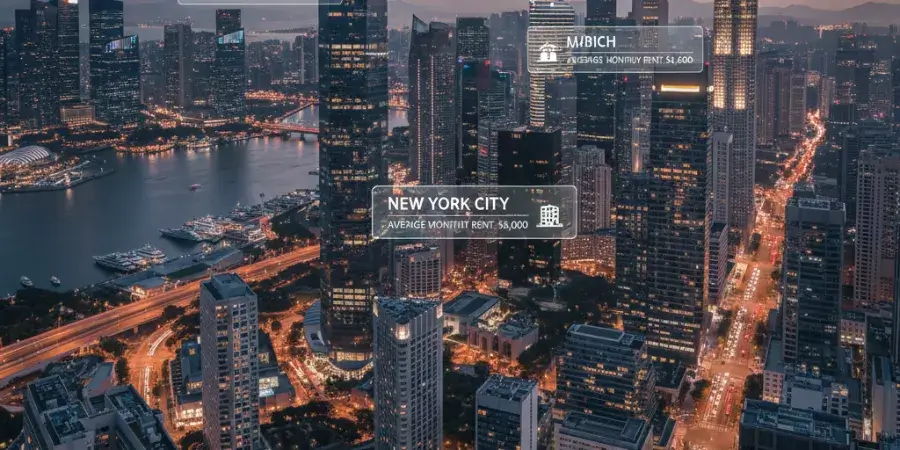A recent ranking shows that urban centres such as New York City and Zurich register cost-of-living indices that surpass many other global locations. According to the cost of living index 2025, New York City holds a baseline score of 100 and Zurich sits at about 93.2 on the same scale. These numbers signal something more than flair or glamour. They point to real influence on how far a dollar, or any currency, stretches in everyday life.
When a city ranks among the most expensive cities in the world it means more than luxury goods or headline real-estate; it means daily living costs, rent, transport, food, utilities all steer budgets sharply. What this really means is anyone considering living, working or investing in one of these places needs to anticipate how cost shapes opportunity.
Key metrics behind the rankings of the most expensive cities in the world
To assess the most expensive cities in the world, analysts examine several data points: cost of living excluding rent, cost including rent, and for expatriates sometimes housing plus goods and services. For example the survey by Numbeo measures these factors and produces the “Cost of Living Plus Rent Index.”
Mercer cost of living report 2025 examined 226 cities worldwide and contrasted more than 200 aspects that included housing, transport, food, clothing, and entertainment. The main point is that the top expensive cities to live in are characterized by consistently high prices for basic needs rather than only one or two luxury items every now and then.
Top cities: a closer look at the most expensive cities in the world
New York City (USA) – New York serves as the benchmark in many global cost of living rankings. With a baseline index of 100 in mid-2025, it sets the standard for what it means to live in one of the most expensive cities in the world. Housing demand remains high, supply is constrained, and services come at a premium. For someone relocating there the message is clear: even moderate lifestyles require preparedness.
- Housing Costs: Central Manhattan rent is above basing USD 4,000 per month, which is the reason New York is always on the top of the cost of living index 2025(baseline 100).
- Transport and Services: A daily commute by subway and taxi amounts to a lot, and service charges make dining and maintenance costs more luxurious.
- High Demand Economy: Being the financial capital of the world, New York is constantly attracting talent and investments, which increases the demand for housing, food, and lifestyle services.
- Cultural Value: In spite of the high cost, the residents have access to an unparalleled career market, education, and a global connection, which makes the city worthy of its luxury.
- Zurich (Switzerland) – Zurich scores around 93.2 in the same mid-2025 index, placing it in the upper echelon of the most expensive cities in the world. The cost of housing is steep, Swiss franc strength plays a role, and quality of life is high. But cost remains one of the highest worldwide.
Strong Currency Impact: The stability of the Swiss Franc is a good thing for the locals but it is a curse for the foreigners since they have to pay more for everything. - Premium Living Standards: Zurich is one of the cleanest and safest places on Earth and that is why it is more expensive in services and housing.
- Real Estate Pressure: There is not much land and the zoning regulations are very strict which makes the most costly cities for housinggo beyond the average prices of most European capitals.
- High Wages, High Prices: People get very good salaries on average but the price of living, from food to entertainment, is hiked in proportion thus keeping Zurich’s luxury tag.
Geneva (Switzerland) – Geneva and Zurich often trade positions in cost rankings. Geneva had a score of about 90.6 in the mid-2025 index. For a global workforce, Geneva tops another list for expensive cities for expats in 2024 according to EuroCost International.
- Arabic Hub for Diplomacy: The international organizations and embassies that are present in the region create a situation where there is an ongoing need for luxurious accommodations and services.
- Housing Shortage: The shortage of available housing is driving the cities with highest rent pricesup; this is mainly because there is a lack of new buildings that can add to the supply.
- Basic Needs: Numbeo’s stats indicate that a person’s basic monthly requirements, excluding the rent, are approximately USD 1,700.
- Life Quality: Besides the above-mentioned reasons for the high cost of living in Geneva, the city also provides top-notch medical services, pure ecological surroundings, and outstanding culture.
Singapore (Singapore) – Singapore ranks among the top of the most expensive cities in the world in Asia. In the Mercer cost of living report 2025, Singapore was among the expensive cities for expats. According to the mid-2025 index it sits around 80.9 (with New York as 100). While slightly lower in that specific scale, Singapore’s real-world expenses for housing, car ownership, and imported goods show its costliness.
- Housing and Car Ownership: Property prices and car license fees are still the highest in Asia, which is mainly due to scarcity of land.
- Efficient Infrastructure: The quality of public services and safety are very good and they are contributing to higher living costs overall.
- Expatriate Hotspot: Mercer’s report places Singapore in the top tier of top expensive cities to live in, primarily on account of schools and housing costs.
- Controlled Supply, High Demand: Urban planning that is very strict does not allow much residential supply, while a professional class that is growing in numbers keeps the demand coming.
Hong Kong (China) – Hong Kong continues to be one of the most expensive cities in the world for housing and imported goods. Global cost of living rankings placed it among the top three globally. Limited land, strong demand for central property, and dependence on imports contribute heavily. A modest apartment can exceed USD 3,000 in monthly rent, and groceries often cost 30% higher than regional averages. Yet many residents justify the cost because of Hong Kong’s connectivity, finance sector, and energy. The city still serves as a significant connector of the two worlds, and the prices in the real estate market support that status in the world.
- Real Estate Dominance: The cost of housing continued to be the largest factor in the budgets of the households. The rent for the smallest flats is usually above USD 3,000 per month, or even more.
- Import Dependency: The city’s reliance on trade has pushed the cost of retail and food greatly through the import of goods.
- Global Financial Hub: The city continues to play its traditional role as a connection between East and West, thus attracting highly paid professionals who subsequently increase the level of consumption and the global city living costs.
- Lifestyle Trade-Off: Nevertheless, the prices remain high, but Hong Kong also offers the best restaurants, access to the business world, and excellent transport that appeal to people with a global lifestyle.
What drives cost in the most expensive cities in the world
What makes a city climb into the category of the most expensive cities in the world?
- Firstly, housing and rentals are the most costly cities for housing When real estate is so expensive and there is not much supply the cost of living goes up, like in Zurich and Singapore.
- Secondly, currency and buying power are very important. A strong local currency makes it difficult for visitors or expatriates to stay in that city.
- Thirdly, imported goods, transportation and infrastructure have an impact. For instance, in Geneva, daily costs for a single person excluding rent were around $1,715 per month.
- Fourth, economic strength on a larger scale and high salaries can lead to more demand for services and goods which in turn increases prices.
Eventually, international migration and remote working are the factors that change demand dramatically. To summarize, if a city is characterized by strong demand, a limited number of housing, high salaries, and global attractiveness, then it is most probably going to be one of the priciest cities to live in financially.
Why understanding the most expensive cities in the world matters for individuals and businesses
If you are an individual planning to relocate, knowing which places rank among the most expensive cities in the world helps you plan salary, savings, dwelling choices and lifestyle expectations. For example, moving to Zurich without accounting for higher everyday expenses may lead to surprises.
For businesses hiring globally it matters for expensive cities for expats, allowances and cost-benefit models. If a firm sends someone to Geneva or Singapore, compensation must reflect that they are living in one of the top expensive cities to live in. Also for investment decisions, real estate or human capital, knowing which cities cost more helps you compare value across locations.
For content professionals writing about global cities it frames context: talk about cost but tie it to quality of life, infrastructure, opportunity. The takeaway: awareness of high cost in these cities gives you power to choose rather than accept.
Conclusion
Being among the most expensive cities in the world does not mean simply luxury everywhere. It means day-to-day life costs substantially more than average. New York City, Zurich, Geneva and Singapore show how housing, currency, global demand, infrastructure and wages combine to lift costs. What this really offers is a choice: you can accept higher costs because you value quality, opportunity or lifestyle, or choose differently with eyes open.
Ultimately the clear takeaway is this: if you aim to live, work or invest in one of the most expensive cities in the world then planning matters. Define what you value, research your cost of living index 2025, and align expectations with reality. A smart understanding of cost gives you freedom rather than constraint.













